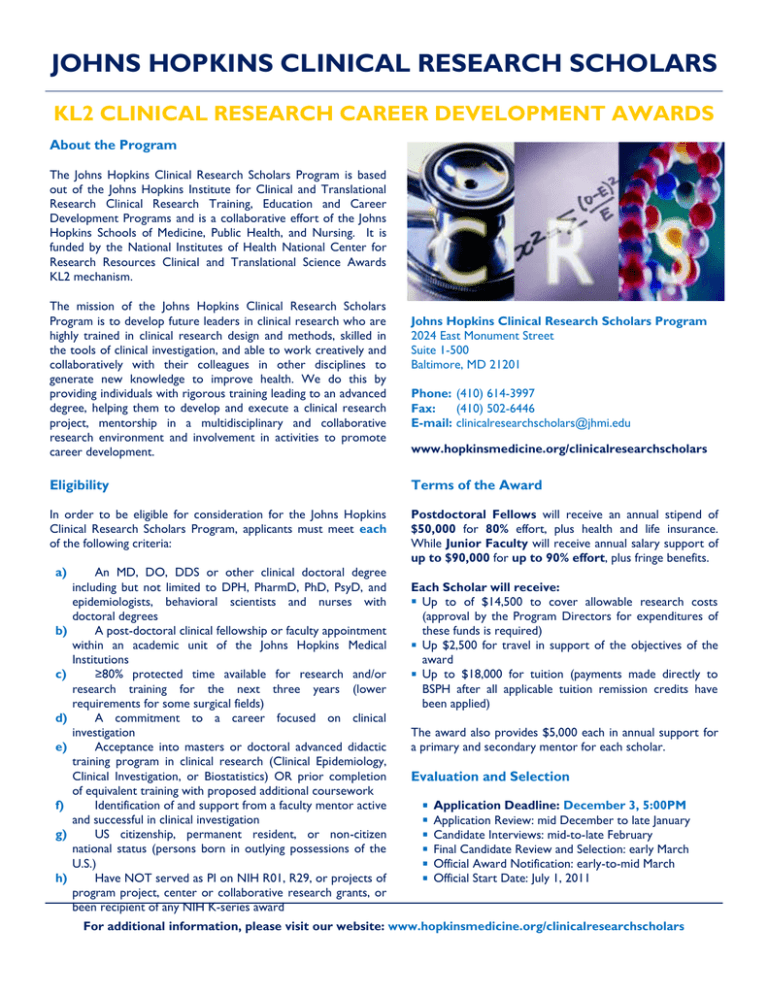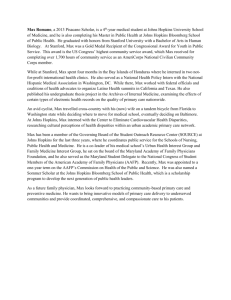JHCRS KL2 Clinical Research Career Development Awards
advertisement

JOHNS HOPKINS CLINICAL RESEARCH SCHOLARS KL2 CLINICAL RESEARCH CAREER DEVELOPMENT AWARDS About the Program The Johns Hopkins Clinical Research Scholars Program is based out of the Johns Hopkins Institute for Clinical and Translational Research Clinical Research Training, Education and Career Development Programs and is a collaborative effort of the Johns Hopkins Schools of Medicine, Public Health, and Nursing. It is funded by the National Institutes of Health National Center for Research Resources Clinical and Translational Science Awards KL2 mechanism. The mission of the Johns Hopkins Clinical Research Scholars Program is to develop future leaders in clinical research who are highly trained in clinical research design and methods, skilled in the tools of clinical investigation, and able to work creatively and collaboratively with their colleagues in other disciplines to generate new knowledge to improve health. We do this by providing individuals with rigorous training leading to an advanced degree, helping them to develop and execute a clinical research project, mentorship in a multidisciplinary and collaborative research environment and involvement in activities to promote career development. Johns Hopkins Clinical Research Scholars Program 2024 East Monument Street Suite 1-500 Baltimore, MD 21201 Phone: (410) 614-3997 Fax: (410) 502-6446 E-mail: clinicalresearchscholars@jhmi.edu www.hopkinsmedicine.org/clinicalresearchscholars Eligibility Terms of the Award In order to be eligible for consideration for the Johns Hopkins Clinical Research Scholars Program, applicants must meet each of the following criteria: Postdoctoral Fellows will receive an annual stipend of $50,000 for 80% effort, plus health and life insurance. While Junior Faculty will receive annual salary support of up to $90,000 for up to 90% effort, plus fringe benefits. a) b) c) d) e) f) g) h) An MD, DO, DDS or other clinical doctoral degree including but not limited to DPH, PharmD, PhD, PsyD, and epidemiologists, behavioral scientists and nurses with doctoral degrees A post-doctoral clinical fellowship or faculty appointment within an academic unit of the Johns Hopkins Medical Institutions ≥80% protected time available for research and/or research training for the next three years (lower requirements for some surgical fields) A commitment to a career focused on clinical investigation Acceptance into masters or doctoral advanced didactic training program in clinical research (Clinical Epidemiology, Clinical Investigation, or Biostatistics) OR prior completion of equivalent training with proposed additional coursework Identification of and support from a faculty mentor active and successful in clinical investigation US citizenship, permanent resident, or non-citizen national status (persons born in outlying possessions of the U.S.) Have NOT served as PI on NIH R01, R29, or projects of program project, center or collaborative research grants, or been recipient of any NIH K-series award Each Scholar will receive: Up to of $14,500 to cover allowable research costs (approval by the Program Directors for expenditures of these funds is required) Up $2,500 for travel in support of the objectives of the award Up to $18,000 for tuition (payments made directly to BSPH after all applicable tuition remission credits have been applied) The award also provides $5,000 each in annual support for a primary and secondary mentor for each scholar. Evaluation and Selection Application Deadline: December 3, 5:00PM Application Review: mid December to late January Candidate Interviews: mid-to-late February Final Candidate Review and Selection: early March Official Award Notification: early-to-mid March Official Start Date: July 1, 2011 For additional information, please visit our website: www.hopkinsmedicine.org/clinicalresearchscholars Features of Training Experience Application Requirements Structured core didactic courses and newly designed courses Practical training in design, conduct, and analysis of clinical research in team settings: Protocol and IRB preparation, patient accrual, data collection, analysis and manuscript writing Apprenticeship and mentorship – Hands on research conduct Engagement in related career development activities (e.g. seminars, conferences, grant writing) Biostatistical & Clinical Research Scientific Resources Core to assist trainees with their specific research project Apply online at www.jhcrs.jhmi.edu Deadline: December 3, 2010 – 5:00PM JHCRS Program Directors Edgar R. (Pete) Miller III, MD, PhD Associate Professor of Medicine & Epidemiology Specialty: General Internal Medicine Medical School: Jefferson Medical College at Thomas Jefferson University Research Interests: Hypertension, clinical trials, non-pharmacologic therapies, antioxidants N. Franklin Adkinson, Jr., MD Professor of Medicine Specialty: Allergy and Clinical Immunology Medical School: Johns Hopkins School of Medicine Research Interests: Drug hypersensitivity, immunotherapy, natural history and management of allergic asthma L. Ebony Boulware, MD, MPH Associate Professor of Medicine & Epidemiology Specialty: General Internal Medicine Medical School: Duke University School of Medicine Research Interests: Quality and access to care in chronic kidney disease; organ donation; racial and ethnic disparities Face sheet Personal statement Plans for proposed advanced didactic training program Curriculum vitae including list of publications Nominating letter from proposed faculty mentor and department/division director Proposed mentor(s) NIH biosketch and research support Two letters of recommendation Transcripts from all academic training MCAT/GRE/USMLE scores OPTIONAL: Recently published papers, manuscripts accepted for publication, active research protocols, or research proposals for external funding Scholar Demographic Breakdown 70 Johns Hopkins Clinical Research Scholars 35 Junior Faculty; 35 Postdoctoral Fellows 12 departments represented: Anesthesia & Critical Care (1); Clinical Psychology (1); Dermatology (1); Medicine (34) – Clinical Pharmacology (1), Cardiology (1), Endocrinology (2), Gastroenterology (4), Geriatric Medicine (1), General Internal Medicine (7), Hematology (1), Infectious Diseases (6), Nephrology (5), Pulmonary & Critical Care (5), Rheumatology (2); Neurology (3); Nursing (4); Oncology (3); Pathology (1); Pediatrics (9) – General Pediatrics (2), Gastroenterology (1), Infectious Disease (3), Neonatology (2), Nephrology (1); Psychiatry (1); Surgery (9) – General Surgery (3), Oncology (1), Otolaryngology (1), Pediatric (1), Transplantation (2), Vascular (1); Urology (1) 64% Female; 36% Male 63% White, 20% Asian-American, 14% AfricanAmerican, 3% Hispanic

